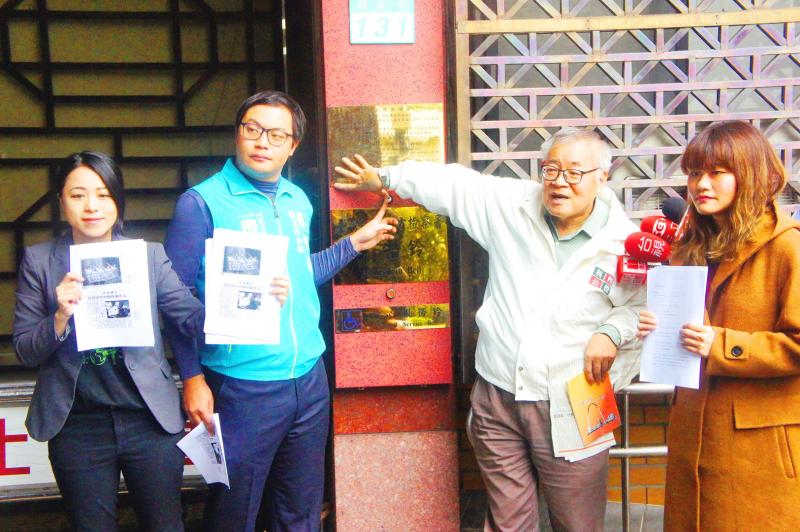China on Wednesday arrested Taiwanese National Party vice chairman Yang Chih-yuan (楊智淵) for alleged involvement in “Taiwan separatist activities.”
Yang traveled to China on Jan. 9, and had not been heard from or seen until he was shown on state media yesterday being escorted by police officers.
Commenting on the arrest, China’s Taiwan Affairs Office spokesman Ma Xiaoguang (馬曉光) told a news conference that “die-hard Taiwanese separatists cannot escape severe punishment under national law.”

Photo: Chien Li-chung, Taipei Times
The Mainland Affairs Council said government agencies had not yet been contacted by Yang’s family to appeal for assistance.
A China Central Television report on the arrest said Yang had been arrested by officers from the Chinese Ministry of State Security in Wenzhou, Zhejiang Province, who said that Yang had “long been engaged in separatist activities aimed at Taiwan’s independence and is suspected of endangering national security.”
The report accused Yang of being involved in the establishment of an “illegal organization,” referring to the Taiwanese National Party, “with the goal of pushing for Taiwan to become a sovereign, independent nation, with the eventual aim of it joining the UN, among other separatist crimes.”
Chinese intelligence agencies had been familiar with Yang for a long time, as he was previously a member of the Taiwan Action Party Alliance — a pro-independence party founded by former president Chen Shui-bian (陳水扁) that dissolved in 2020, a source said.
His arrest was likely meant to pressure Taiwan in the wake of US House of Representatives Speaker Nancy Pelosi’s visit to the country, the source added.
Yang was also involved in the 2008 Wild Strawberries movement and the 2013 “Fury” rally against then-president Ma Ying-jeou (馬英九), the source said, adding that he previously assisted a Chinese dissident seeking asylum in Taiwan.
However, Yang had also been friendly with the pan-blue camp and was even courted by the China Unification Promotion Party to run for it in a local election, the source said.
The Democratic Progressive Party (DPP) yesterday said in a statement that it “strongly condemned China’s lack of respect for human rights and the rule of law, and its use of free Taiwanese citizens as a tool for political blackmail.”
The arrest contravened the terms of the Cross-Strait Joint Crime-Fighting and Judicial Mutual Assistance Agreement (海峽兩岸共同打擊犯罪及司法互助協議), as Chinese authorities did not notify the government or Yang’s family of the arrest, the DPP said, citing a Mainland Affairs Council news release.
Executive Yuan spokesman Lo Ping-cheng (羅秉成) told a news conference that the Ministry of Justice had not been given details about the arrest, adding that the government would follow the case’s development.
Lo said the government urged China to respect personal freedoms including free speech, and to refrain from indiscriminate arrests and abuse of power, which affect the rights and interests of Taiwanese in China.
Additional reporting by Chen Yun and Lee Hsin-fang

A magnitude 5.6 earthquake struck off the coast of Yilan County at 12:37pm today, with clear shaking felt across much of northern Taiwan. There were no immediate reports of damage. The epicenter of the quake was 16.9km east-southeast of Yilan County Hall offshore at a depth of 66.8km, Central Weather Administration (CWA) data showed. The maximum intensity registered at a 4 in Yilan County’s Nanao Township (南澳) on Taiwan’s seven-tier scale. Other parts of Yilan, as well as certain areas of Hualien County, Taipei, New Taipei City, Taoyuan, Hsinchu County, Taichung and Miaoli County, recorded intensities of 3. Residents of Yilan County and Taipei received

Taiwan has secured another breakthrough in fruit exports, with jujubes, dragon fruit and lychees approved for shipment to the EU, the Ministry of Agriculture said yesterday. The Animal and Plant Health Inspection Agency on Thursday received formal notification of the approval from the EU, the ministry said, adding that the decision was expected to expand Taiwanese fruit producers’ access to high-end European markets. Taiwan exported 126 tonnes of lychees last year, valued at US$1.48 million, with Japan accounting for 102 tonnes. Other export destinations included New Zealand, Hong Kong, the US and Australia, ministry data showed. Jujube exports totaled 103 tonnes, valued at

BIG SPENDERS: Foreign investors bought the most Taiwan equities since 2005, signaling confidence that an AI boom would continue to benefit chipmakers Taiwan Semiconductor Manufacturing Co’s (TSMC, 台積電) market capitalization swelled to US$2 trillion for the first time following a 4.25 percent rally in its American depositary receipts (ADR) overnight, putting the world’s biggest contract chipmaker sixth on the list of the world’s biggest companies by market capitalization, just behind Amazon.com Inc. The site CompaniesMarketcap.com ranked TSMC ahead of Saudi Aramco and Meta Platforms Inc. The Taiwanese company’s ADRs on Tuesday surged to US$385.75 on the New York Stock Exchange, as strong demand for artificial intelligence (AI) applications led to chip supply constraints and boost revenue growth to record-breaking levels. Each TSMC ADR represents

TRUST: The KMT said it respected the US’ timing and considerations, and hoped it would continue to honor its commitments to helping Taiwan bolster its defenses and deterrence US President Donald Trump is delaying a multibillion-dollar arms sale to Taiwan to ensure his visit to Beijing is successful, a New York Times report said. The weapons sales package has stalled in the US Department of State, the report said, citing US officials it did not identify. The White House has told agencies not to push forward ahead of Trump’s meeting with Chinese President Xi Jinping (習近平), it said. The two last month held a phone call to discuss trade and geopolitical flashpoints ahead of the summit. Xi raised the Taiwan issue and urged the US to handle arms sales to